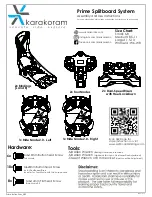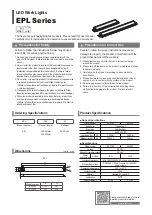
16
USE R GUI DE
|
P OR T A -R AY
®
4 0 0 R
Definition of Terms
Flood Lamp System -
Set of components arranged to generate, collect, condition and direct UV radiant energy to perform
curing of engineering adhesives, coatings, and inks within a safe and controlled process. It includes a lamp housing and power
supply and may also include a shutter, workstation, UV enclosure, Dymax Light Shield, or other accessories.
Lamp
- Light source (bulb or burner) generating ultraviolet, visible, and infrared radiant energy from burning matter stimulated
by electrical power conditioned by a proper power supply which is an integral part of a Lamp. A light source is usually placed
into a reflector (of various geometry) to increase light-source efficiency by collecting and directing radiant energy of selected
spectra (for a given curing process).
Intensity
- a measure of light energy over the unit of surface area (usually surface at the specified working distance from the
bottom of a reflector housing) in W/cm
2
or mW/cm
2
. For the UV portion of light, this measure is often called in literature
“irradiance”, i.e. radiant energy arriving at a point on a surface per unit area.
Brightness
, also known as
Luminance
- description of energy in the visible region of the spectrum (approximately from 400 to
700 nm) and
recorded in photometric units. “
Intensity
” (see below) of visible
-light energy is called Illuminance.
Illuminance
- luminous flux (energy
of visible light)
incident per unit area, and measured in
Lx
(lux) or
Lumen/cm
2
.
Ultraviolet (UV)
- The invisible region of the spectrum just beyond the violet end of the visible region. Wavelength ranges in
general from 1.0 to 400 nm. Dymax
bulbs (burners) do not radiate energy in deep ultraviolet; there are very minute amounts
below 220 nm and practically nothing can be sensed below 200 nm. This is due to the use of an ozone-blocking quartz-bulb
envelope (See Ozone).
Ultraviolet is used beneficially in various fields of industry and medicine. In order to standardize light sources used in medicine,
in Copenhagen in 1932, The International Congress on Light recommended dividing the ultraviolet spectrum into three
spectral parts:
1.
Ultraviolet A
(UV-A) - UV of long wavelength from within approximately 400 to 320 nm of the spectral band (4000 to
3200
) - predominately produced by Dymax Flood Lamps.
2.
Ultraviolet B
(UV-B) - UV of medium wavelength from within approximately 320 to 280 nm - Dymax Flood Lamps produce
some amount of their energy within this bandwidth.
3.
Ultraviolet C
(UV-C) - UV of short wavelength below 280 nm (we say from 280 to 200 nm)
–
a large amount of this energy
is present in the sunlight.
Dose
- is irradiance integrated over time, or Irradiance (W/cm
2
) x Time (s) = Dose (Joules/cm
2
). Note: Watt is the power that
gives rise to the production of energy at the rate of 1-joule (J) per second (s).
Ozone
- oxidizing agent (O
3
) produced by the action of ultraviolet radiant energy (below 185 nm) or electrical corona
discharge of oxygen on air.
OSHA
1910.145: “Regulation of Accident prevention Signs and Tags” defines the following
headers as:
WARNING:
Calls out a
hazardous situation that has some probability of severe injury.
CAUTION:
Indicates a hazardous situation that may result in minor or moderate injury.
NOTICE
–
is used to convey a message related directly or indirectly to the safety of personnel, or protection of property.
Содержание PORTA-RAY 400R
Страница 1: ...PORTA RAY 400R Portable UV Light Curing Flood Lamp User Guide ...
Страница 19: ...USER GUIDE PORTA RAY 400R 19 ...





































